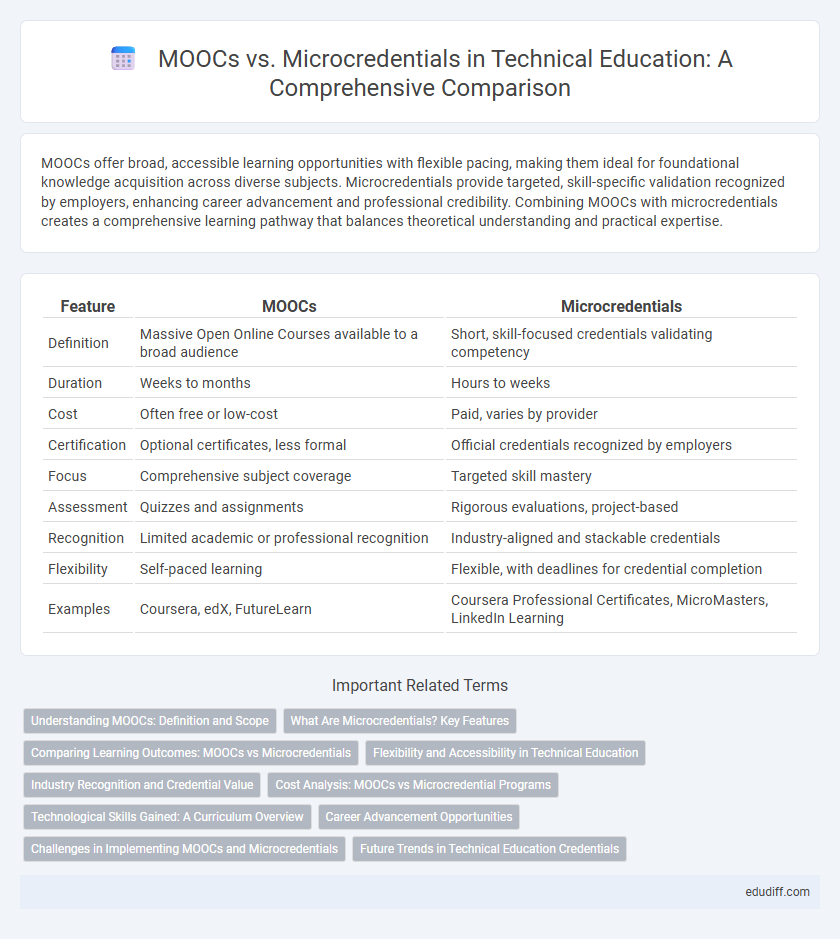MOOCs offer broad, accessible learning opportunities with flexible pacing, making them ideal for foundational knowledge acquisition across diverse subjects. Microcredentials provide targeted, skill-specific validation recognized by employers, enhancing career advancement and professional credibility. Combining MOOCs with microcredentials creates a comprehensive learning pathway that balances theoretical understanding and practical expertise.
Table of Comparison
| Feature | MOOCs | Microcredentials |
|---|---|---|
| Definition | Massive Open Online Courses available to a broad audience | Short, skill-focused credentials validating competency |
| Duration | Weeks to months | Hours to weeks |
| Cost | Often free or low-cost | Paid, varies by provider |
| Certification | Optional certificates, less formal | Official credentials recognized by employers |
| Focus | Comprehensive subject coverage | Targeted skill mastery |
| Assessment | Quizzes and assignments | Rigorous evaluations, project-based |
| Recognition | Limited academic or professional recognition | Industry-aligned and stackable credentials |
| Flexibility | Self-paced learning | Flexible, with deadlines for credential completion |
| Examples | Coursera, edX, FutureLearn | Coursera Professional Certificates, MicroMasters, LinkedIn Learning |
Understanding MOOCs: Definition and Scope
Massive Open Online Courses (MOOCs) are online courses designed for large-scale participation and open access via the internet, offering a range of subjects from universities and institutions worldwide. They provide flexible learning opportunities with video lectures, readings, and interactive assessments, enabling learners to gain knowledge without formal enrollment constraints. MOOCs serve as a foundation for skill development and often act as gateways to more specialized microcredentials that validate skills in specific professional areas.
What Are Microcredentials? Key Features
Microcredentials are short, focused certifications that validate specific skills or competencies acquired through targeted learning experiences. They typically emphasize practical, job-relevant knowledge and are often issued by educational institutions, professional organizations, or employers to enhance workforce readiness. Key features include digital badges, stackability for broader qualifications, and alignment with industry standards for rapid skill verification.
Comparing Learning Outcomes: MOOCs vs Microcredentials
MOOCs offer broad knowledge coverage and flexibility, attracting millions of learners globally, while microcredentials provide targeted skill verification aligned with industry standards and employer demands. Studies reveal microcredentials often lead to higher job placement rates and skill retention due to their competency-based structure and assessment rigor. The choice between MOOCs and microcredentials depends on learners' goals: comprehensive understanding versus validated proficiency for career advancement.
Flexibility and Accessibility in Technical Education
MOOCs offer unparalleled flexibility by allowing learners to access a wide variety of technical courses anytime and anywhere, adapting to diverse schedules and learning paces. Microcredentials provide targeted skill validation through short, focused programs that are often stackable and recognized by industry leaders, enhancing career mobility. Both formats improve accessibility by reducing geographic and financial barriers, enabling a broader audience to advance in technical education.
Industry Recognition and Credential Value
Microcredentials often provide targeted skills recognized by industry leaders, enhancing employability through practical, job-specific knowledge. MOOCs deliver broad foundational concepts but may lack formal recognition from employers compared to microcredentials. Industry partnerships and credential endorsements significantly increase the value and acceptance of microcredentials in professional fields.
Cost Analysis: MOOCs vs Microcredential Programs
MOOCs typically offer free initial access with optional paid certificates averaging $50 to $200, making them cost-effective for foundational learning. Microcredential programs, often priced between $500 and $2,000, provide more structured, comprehensive content with institutional recognition that can enhance career prospects. Cost analysis reveals MOOCs as budget-friendly options for skill acquisition, while microcredentials justify higher fees through credential value and job market impact.
Technological Skills Gained: A Curriculum Overview
MOOCs offer a broad range of foundational technological skills across disciplines such as data science, programming, and cybersecurity, often emphasizing theory and conceptual understanding. Microcredentials provide targeted, specialized training on specific technologies or tools like cloud computing platforms, machine learning frameworks, or blockchain development, designed for immediate industry application. The curriculum structure in microcredentials tends to be modular and competency-based, allowing learners to acquire distinct technical proficiencies that align closely with current job market demands.
Career Advancement Opportunities
MOOCs offer broad foundational knowledge accessible to a wide audience, enhancing general skills but often lacking targeted career advancement benefits. Microcredentials provide specialized, industry-recognized certifications aligned with employer demands, directly boosting employability and professional growth. Employers increasingly value microcredentials for their ability to demonstrate verified expertise and readiness for specific job roles.
Challenges in Implementing MOOCs and Microcredentials
Implementing MOOCs and microcredentials faces challenges in ensuring consistent course quality and learner engagement across diverse platforms. Credential recognition and alignment with industry standards often lag, limiting their acceptance in professional settings. Technical infrastructure limitations and data privacy concerns further complicate widespread adoption and scalability.
Future Trends in Technical Education Credentials
Microcredentials are rapidly redefining technical education by offering targeted skill validation aligned with emerging industry demands, enabling learners to upskill efficiently in areas like artificial intelligence, cybersecurity, and data analytics. Unlike MOOCs, which provide broad-based knowledge, microcredentials emphasize practical, competency-based assessments that employers increasingly recognize as proof of job readiness. This shift towards modular, stackable credentials is expected to drive greater adoption in professional development and lifelong learning, fostering a more agile, future-proof workforce.
MOOCs vs Microcredentials Infographic

 edudiff.com
edudiff.com